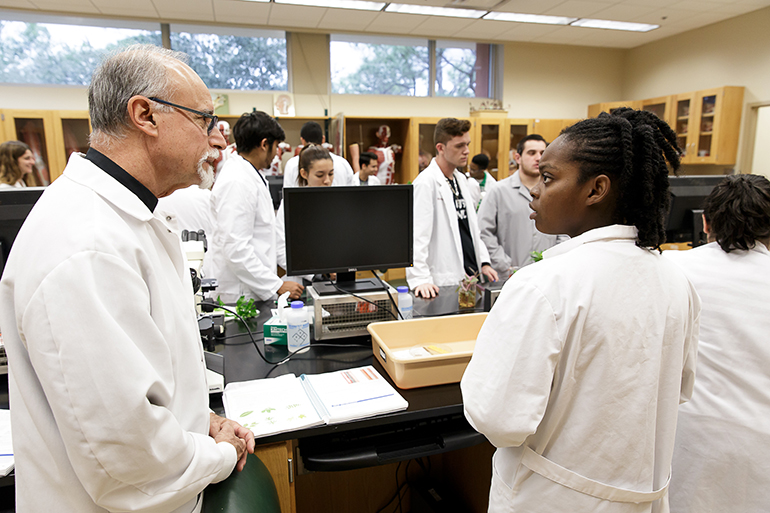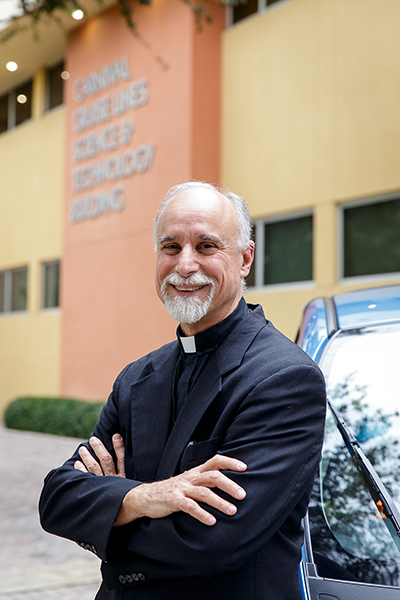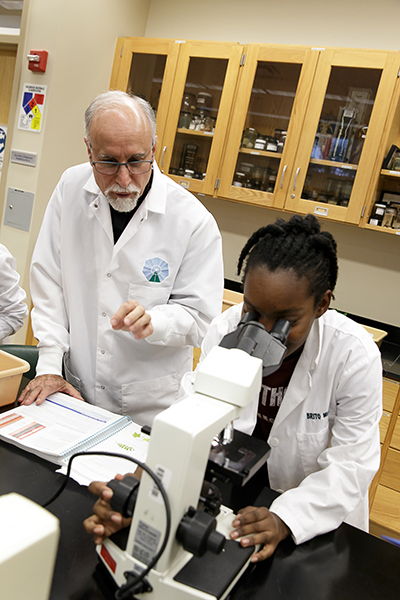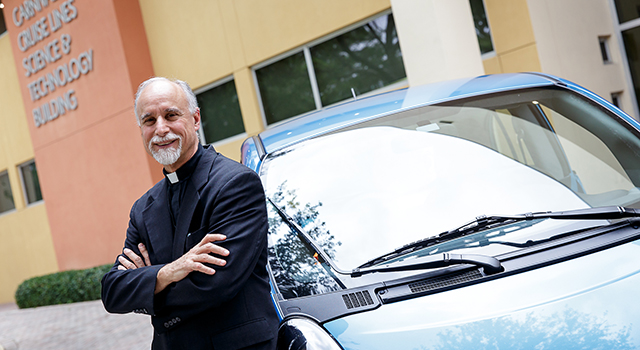By Tom Tracy - Florida Catholic

Photographer: TOM TRACY | FC
Father Alfred Cioffi helps students conduct biology experiments during a lab class at St. Thomas University.
MIAMI | The rapid pace of scientific advancements, along with the steady decline of defense for human life, can seem overwhelming — especially for lay Catholics not closely following complex trends.
In vitro fertilization, human embryonic stem cell research, human cloning, prenatal screening, interspecies experimentation, euthanasia, physician-assisted suicide and widespread legalized abortion are some of the complex issues facing what one local priest educator calls the “silent majority of Catholics and non-Catholics” — people who are personally opposed but largely silent about threats to human life.

Photographer: TOM TRACY | FC
Father Alfred Cioffi poses in front of his electric car.
“My advice to all peoples, Catholics and non-Catholics, is to become involved in the life issues before it’s too late and before we go further into a blatant disrespect for the dignity and sanctity of all human life,” said Father Alfred Cioffi, assistant professor of biology and bioethics at Miami’s St. Thomas University.
To that end, STU is exploring the addition of a master’s of bioethics program later this year.
The coursework would cover topics such as fundamental scientific and theological principles used in Catholic bioethics, responsible research conduct, bioethical issues at the beginning of human life, bioethical issues at the end of human life, health care bioethics, environmental bioethics, biostatistics and special topics in bioethics.
The program would run continuously for four semesters: summer, fall, spring and summer, and would consist of courses — two per semester — for a total of 30 graduate credits, according to Father Cioffi.
He points out the work of recent popes in promoting an expert understanding and defense of human life as they intersect with everything from modern-day human trafficking and abortion to the protection of the environment.
“We know that both Pope Saint John Paul II and Pope-emeritus Benedict XVI were great champions of the life issues — significantly, with deep documents, such as Donum Vitae, Evangelium Vitae, and Dignitas Personae,” Father Cioffi said. “And now, with his encyclical on the environment, Laudato Si’, Pope Francis expands the respect due beyond human life to all life on earth.”
In 1973, the future priest was in his early 20s, studying for a bachelor’s in biology at Florida International University with a view toward becoming a marine biologist. That same year, the U.S. Supreme Court decided to legalize abortion at any time during pregnancy.
“That decision was a tremendous shock to me, since it essentially negated everything that I had been learning for the past three years regarding human life and embryonic development,” Father Cioffi said. At that moment, long before he became an ordained clergy, he got involved in pro-life work.

Photographer: TOM TRACY | FC
Father Alfred Cioffi helps students conduct biology experiments during a lab class at St. Thomas University.
“From the Christian perspective, I could not think of any other group of people who are truly the ‘least amongst us’ as the unborn, since their very life is radically dependent on their mom, the family and friends of their mom, and society at large,” said Father Cioffi.
At STU, he teaches biology and bioethics, and researches urban forest conservation and solar energy alternatives. He is also associated with the National Catholic Bioethics Center, the Florida Catholic Conference, the Catholic Medical Association, the Knights of Columbus, Catholic Health Services, prison ministry and the respect life ministry of the Archdiocese of Miami.
Last November, Father Cioffi flew to Geneva, Switzerland, to participate in the third in a series of international dialogues between science and faith sponsored by the European Center for Nuclear Research (CERN).
In 2012, CERN announced the discovery of the most refined experimental evidence for the Higgs boson particle, a subatomic particle that had been theoretically predicted since the 1960s.
Being the smallest particle of matter discovered to date, it has the potential of unifying the four fundamental forces of the Standard Model in physics. Because of this, media have dubbed the Higgs boson the “God Particle.”
Within a couple of months of this discovery, CERN convened a first international dialogue between religion and science entitled: “The Big Bang and the interfaces of knowledge: towards a common understanding of Truth?” Scientists, philosophers and theologians from various parts of the world participated in the dialogues.
Although not a physicist himself, Father Cioffi was highly interested in the conversations at CERN, and was among several clergy and religious professionals of various backgrounds who attended the recent CERN conference in Europe.
“This conversation was going into the metaphysical world, including philosophy and theology; it was the science community reaching out to the philosophers and theologians of the world,” Father Cioffi said.
The meeting included some 50 men and women — scientists (physicists and mathematicians and one geneticist), philosophers and theologians from around the world, including Catholics, Protestants, Orthodox Christians, Buddhists and humanists. Among the priests were a Jesuit from South America and a Pole who works at the Vatican’s Pontifical Council for Culture.
The result was three days of intense, wide-ranging dialogue that will result in a summary document this summer but not a common statement or finding.
“It was a tremendous privilege to participate in this and open our eyes to other (faith) traditions as we examined the question of a common logic in terms of the Big Bang (theory),” Father Cioffi said.
“Each one of us had two morning and two afternoon dialogues, and common meals over which we had conversations with no real desire to answer anything but rather to dialogue and see what other questions could come up,” Father Cioffi said
He added that the Higgs boson particle theory generally gives more substance to the Big Bang theory, which is not in conflict with Catholic understanding of the origins of the universe.
“As long as we do not misinterpret Sacred Scripture in a fundamentalist way, the scientific understanding of the origin of the universe and of the world does not contradict what our Judeo-Christian tradition tells us,” he said.
He added that now is a good time for Catholics to fully heed the urgent call of Pope Francis to protect and defend all life on earth at every stage of development.
“Let us become informed, and get involved,” Father Cioffi said.
Experts to speak on climate change
St. Thomas University will host an International Conference on Climate Change, Feb 18 and 19, from 9 a.m. to 4 p.m. Cardinal Peter Turkson, Pope Francis's right-hand man on climate change and president of the Pontifical Council for Justice and Peace, will be at the conference speaking about the social responsibility to mobilize and curb climate change. Cardinal Turkson, who helped draft the eco-encyclical “Laudato Si’: On Care For Our Common Home,” will also be participating in panel discussions and Q&A sessions during the two days. For more information, visit: www.stu.edu/climateconference.

